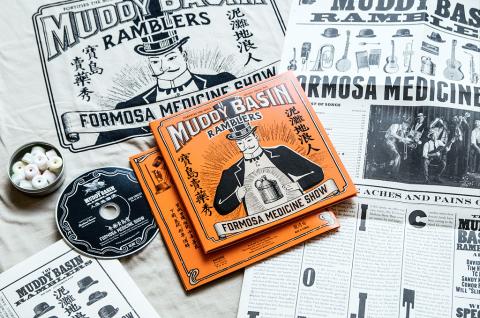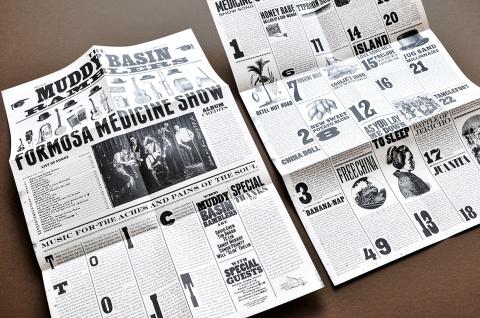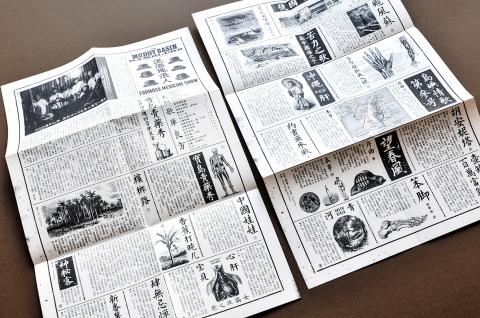Muddy Basin Rambler fans and the swing dance community are polishing their spats and practicing their steps ahead of the band’s concert at a Christmas party at the Mega City shopping mall in New Taipei City’s Banciao District (板橋) on Tuesday.
The six-man group which was formed a decade ago, has been busy this year promoting their second CD, the 23-song double album Formosa Medicine Show, which was released in October last year, and making plans to begin recording a new one next spring.
However, front man David Chen (陳思銘) — a former Taipei Times features writer — and his band mates have another reason to feel like partying — not that they ever need much of an excuse.

Photo Courtesy of the Muddy Basin Ramblers
Chen and Andrew Wong (黃家賢), director of Onion Design Associates (洋蔥設計), were nominated on Dec. 5 as art directors for a Grammy for Best Recording Package for the Formosa Medicine Show.
It was a bit of Christmas-come-early for both men, although they will have to wait until Feb. 8 to find out the results.
It is the sixth time that Taiwan-based designers have been nominated for their album packaging, though none have won. Xiao Qing-yang (蕭青陽) has been been nominated four times and Cheng Szu-wei (鄭司維) once.

Photo Courtesy of Andrew Wong
The Hong Kong-born Wong, who studied graphic design, typography and art history at the University of Houston, Texas, established his Taipei-based design studio in 2000 with partner Janett Wang.
Onion Design lists several of the nation’s top cultural institutions among its clients, including Cloud Gate Dance Theatre (雲門舞集), the National Palace Museum and the Junming Museum, as well as big corporate names.
Wong said he was shocked to learn of his nomination.

Photo Courtesy of Andrew Wong
“I didn’t believe it at first and didn’t expect it at all,” he said.
However, the designer is not feeling optimistic — perhaps because he and colleague Yang Fong-ming (楊豐銘) were in the running for a Golden Melody Award for best packaging for the CD back in June and did not win, or perhaps because Xiao and Cheng failed to win when they were nominated for Grammys.
Wong also noted that he and Chen are up against some tough competition, including albums by Pearl Jam, Passenger, FKA twigs and the Pixies.

Photo Courtesy of Andrew Wong
The latter’s CD, Indie Cindy, was done by "the legendary designer Vaughan Oliver, who did tons of 4AD [an independent label] classic records in the 1980s and 1990s,” Wong said.
He added that it would be nice to win and “bring back the trophy.”
Chen, who had filled out all the forms to apply for the Grammy awards back in August — something he credits his wife, Robyn, for pushing him to do — said he was equally shocked to learn from a friend on Facebook that the CD had actually been nominated.
“I had just woken up and was checking my messages, all groggy-eyed, and the person had written to say congratulations. I was like, for what? I saw ‘Grammy’ in the message and then it dawned on me. So I quickly went to the Grammy Web site to check, my heart racing. And there it was,” he said.
He said the main reason he applied was it was a way of thanking Wong.
“We thought his work was just so awesome and we wanted to help him out as much as possible, as he was so generous with his time and basically charged us a very low fee to do the work,” Chen said. “This accolade really belongs to him, and truly reflects on him and his team.”
Chen and Wong are not the only Taiwan-based artists who are looking forward to the Grammy ceremony. New Taipei City-based Wind Music (風潮音樂) is up for Best World Music Album, along with Los Angeles-based Daniel Ho Creations, for Our World in Song by Chinese pipa virtuoso Wu Man (吳蠻), Luis Conte and Daniel Ho.
The songs for Formosa Medicine Show, most of which were written by Chen, tell stories about hucksters, vagabonds and itinerant musicians traveling in Taiwan and elsewhere in Asia from the early 1900s to the 1950s. The musical styles include traditional blues, US hillbilly music, ragtime and swing jazz, although the band also included a cover of the Taiwanese classic, Wang Chun Feng (望春風).
To help capture an “old time” sound, the band used a vintage, RCA-style microphone from the middle of the last century and radio equipment from the 1930s.
The design is in keeping with newsprint publicity materials used by traveling minstrel and medicine shows in the US in the late 19th and early 20th centuries that pedaled “patent medicines” and folk cures in rural areas.
In addition to the Ohio-born Chen, who has been in Taipei since 1997, the band includes five other long-terms expatriates: Tim Hogan on washboard and percussion; TC Lin on washtub bass, baritone and trumpet; Sandy Murray, on ukulele and tenor and soprano saxophones; Conor Prunty on harmonica, washtub bass and ukulele; and Will Thelin on jug, kazoos, trombone and vocals.
The subhead has been corrected since the story was first published to reflect that it was the album designers, not the band itself, who were nominated for a Grammy.

Taiwan has next to no political engagement in Myanmar, either with the ruling military junta nor the dozens of armed groups who’ve in the last five years taken over around two-thirds of the nation’s territory in a sprawling, patchwork civil war. But early last month, the leader of one relatively minor Burmese revolutionary faction, General Nerdah Bomya, who is also an alleged war criminal, made a low key visit to Taipei, where he met with a member of President William Lai’s (賴清德) staff, a retired Taiwanese military official and several academics. “I feel like Taiwan is a good example of

March 2 to March 8 Gunfire rang out along the shore of the frontline island of Lieyu (烈嶼) on a foggy afternoon on March 7, 1987. By the time it was over, about 20 unarmed Vietnamese refugees — men, women, elderly and children — were dead. They were hastily buried, followed by decades of silence. Months later, opposition politicians and journalists tried to uncover what had happened, but conflicting accounts only deepened the confusion. One version suggested that government troops had mistakenly killed their own operatives attempting to return home from Vietnam. The military maintained that the

Before the last section of the round-the-island railway was electrified, one old blue train still chugged back and forth between Pingtung County’s Fangliao (枋寮) and Taitung (台東) stations once a day. It was so slow, was so hot (it had no air conditioning) and covered such a short distance, that the low fare still failed to attract many riders. This relic of the past was finally retired when the South Link Line was fully electrified on Dec. 23, 2020. A wave of nostalgia surrounded the termination of the Ordinary Train service, as these train carriages had been in use for decades

Lori Sepich smoked for years and sometimes skipped taking her blood pressure medicine. But she never thought she’d have a heart attack. The possibility “just wasn’t registering with me,” said the 64-year-old from Memphis, Tennessee, who suffered two of them 13 years apart. She’s far from alone. More than 60 million women in the US live with cardiovascular disease, which includes heart disease as well as stroke, heart failure and atrial fibrillation. And despite the myth that heart attacks mostly strike men, women are vulnerable too. Overall in the US, 1 in 5 women dies of cardiovascular disease each year, 37,000 of them